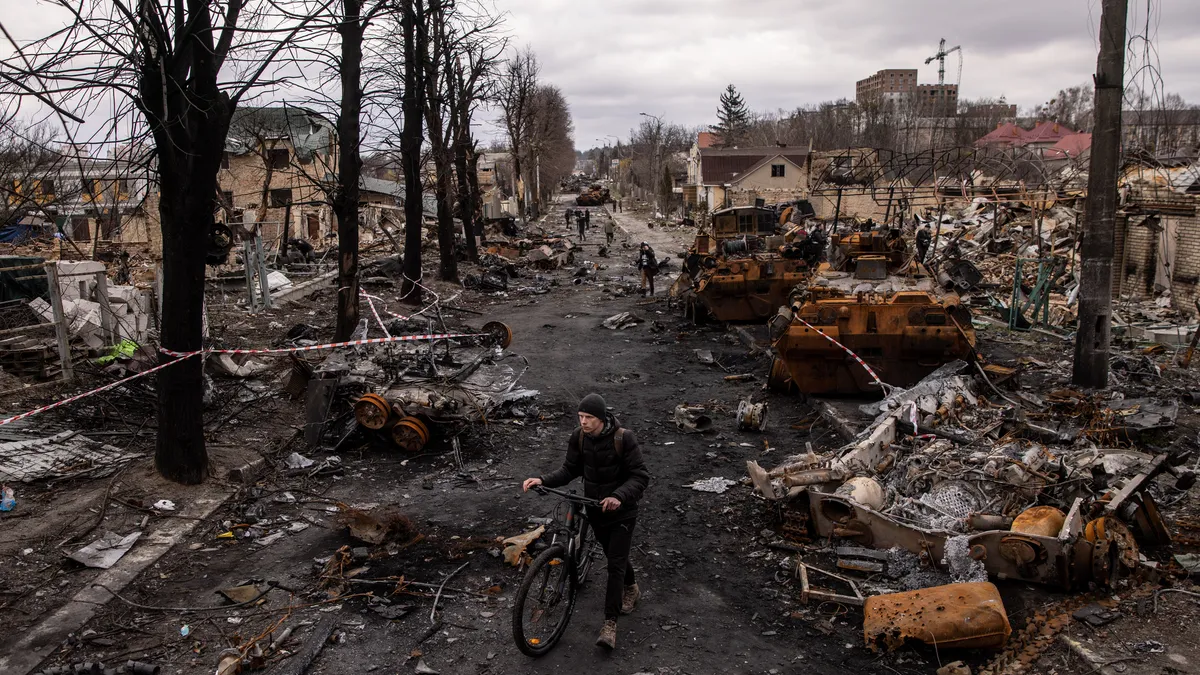Dive Brief:
- Regional wars, trade disputes and other geopolitical conflicts mark a shift in global order that opens opportunities as well as risks to CFOs and their C-suite colleagues, according to McKinsey.
- Business leaders facing international instability tend to focus on vulnerabilities to company products, operations, suppliers and workforces while overlooking ways to tailor growth strategies, core operations, technology stacks, talent profiles and asset allocation to disruption, McKinsey said in a report.
- “The executives who think deeply and act on the shifting world order today will be the market leaders of tomorrow,” Shubham Singhal, a senior partner at McKinsey and co-author of the report, said Tuesday in an email reply to questions. “The geopolitical disruption has opened up both significant downside risks for businesses while at the same time creating new opportunities.”
Dive Insight:
The financial and political order built after World War II has faced challenges this decade from emerging powers, including obstacles to the flow of goods, capital and services and outright conflicts in the Middle East and Ukraine.
Interventions in global trade have surged 12-fold since 2010, with tariffs on Sino-U.S trade rising sixfold since 2017, McKinsey said.
“CEOs and boards understand that a shift in the global order is underway,” according to McKinsey, a global consulting firm.
“Even as they improve their resilience to shocks, business leaders should focus on opportunities for risk-adjusted value creation,” McKinsey said in the report, urging executives to turn “an eye toward thriving and not just surviving.”
Companies that fail to take a proactive approach to geopolitical shifts risk missing out on new trade corridors and industrial-policy-driven subsidies, thereby suffering slower growth, Singhal said. They may also lose a competitive edge in cost structure and face “catastrophic changes,” such as forced market exits.
Business leaders need to consider whether new tariffs and taxes will make their company’s products more or less expensive compared with the products of rival companies, McKinsey said. They should determine how new economic and security alliances will open up avenues for growth or ways to trim costs, and how the risk-adjusted cost of capital is changing region-by-region.
For example, a medical devices company based in North America could take advantage of trade agreements and cut operating costs by 15% to 25% by moving its manufacturing to Mexico from another country, McKinsey said.
“Business leaders who disproportionately focus on the downsides can find themselves paralyzed, perpetually on guard for the occurrence of high-severity, but low-probability geopolitical events,” McKinsey said.
Instead, top executives should consider how their companies may gain from changes in economic, industrial, security and defense policies, McKinsey said. Such shifts can lead to new government initiatives in tariffs, trade, capital deployment and supply chain flows.
CFOs and their C-suite colleagues can adapt to geopolitical disruption, McKinsey said, by:
Broadening their view of corporate strategy. Companies should track economic policies and geopolitical risks as closely as they monitor changes in tax, regulation and other impacts on strategy, McKinsey said. They should identify which global economic shifts would most affect company interests and determine both potential harm and opportunities for growth.
Business leaders should consider insurance policies that would mitigate risks and the investments that would allow their companies to take advantage of uncertain but potentially big growth opportunities, McKinsey said.
Top executives should also plan for a range of scenarios and stage “tabletop exercises” that identify how best to respond to an outbreak of local conflicts, changes in tariffs or industrial policies, and other potential disruptions, McKinsey said. They can draw up “crisis response playbooks,” providing a starting point for adapting to a range of sudden disorders.
Future proof against trade and nontrade barriers. Companies should anticipate the impact of potential laws, policies and regulations to avert the financial and reputational costs from forced exits from markets, McKinsey said.
For example, BP pulled out of Russia three days after the start of the invasion of Ukraine, leaving behind its holdings in Rosnet, a Russia-based oil and gas company, according to McKinsey.
“As a result, BP had to take a charge of more than $24 billion in its accounts and its earnings were reduced by $2 billion a year,” McKinsey said.
Build a “geopolitical functional group.” Companies that react quickest to geopolitical disruption have often deployed a team that monitors geopolitics, helps in forecasting, plans for various scenarios and keeps senior leaders and the board informed of risks, McKinsey said.
Such teams enable top executives “to react quickly and, in the longer term, establish a culture of geopolitical resilience in their organizations,” according to McKinsey.













